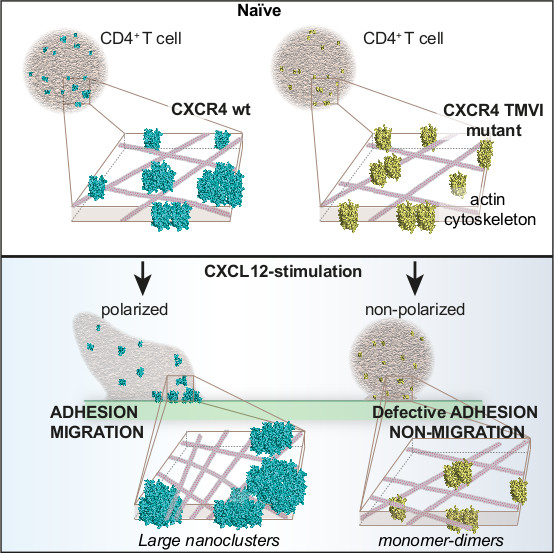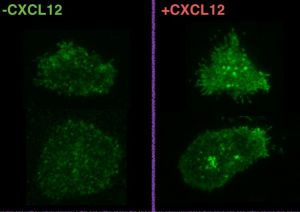Chemokine receptors are cell membrane proteins that are central to many biological processes, as they position cells and direct their movement. They do not act individually or in pairs, as was previously thought, but form aggregates of up to ten units to carry out their function more efficiently. This is shown in a study published in the journal Molecular Cell, which analyzes CXCR4 dynamics and its disposition in the cell membrane. The authors suggest that preventing aggregation of these receptors could be used as a basis for new therapeutic strategies against diseases in which CXCR4 has an important role, such as tumour metastasis, autoimmune diseases, or AIDS (CXCR4 is one of the receptors some HIV strains use to infect cells).
The study, carried out by researchers of the Centro Nacional de Biotecnología of the CSIC (CNB-CSIC) in collaboration with the ICFO (Instituto de Ciencias Fotónicas) of Barcelona and the CNIC (Centro Nacional de Investigaciones Cardiovasculares Carlos III) of Madrid, shows that association of these receptors in groups enables full activation of the cell signalling machinery necessary for correct cell orientation and movement. "These aggregates are more active than individual or paired receptors," says Mario Mellado, director of the study and a CNB-CSIC scientist. “In addition, it is a mechanism that allows the cell to adapt very quickly to changes in its environment and to respond very effectively. "
The scientists also identified small peptides able to prevent formation of these aggregates, and thus block cell function. "These results enable the development of therapies based on compounds that interfere with aggregate formation by specific chemokine receptors. It is a strategy that could be used to treat diseases such as cancer, HIV infection or autoimmune diseases, "explains Mellado.To carry out this study, advanced optical imaging techniques and biophysical studies were used. They allowed the scientists to observe that stimulating the CXCR4 receptor with its ligand –a molecule that binds to the receptor– increased the size of the aggregates and decrea
sed the number of monomers (individual receptors) and dimers (receptors in pairs). The results of the study indicate that this aggregation process is also influenced by actin, a protein that makes up part of the cytoskeleton. All these factors regulate and control CXCR4 clustering on the cell surface and thus,
activation of the signaling machinery need to promote full function in the cell."These results are important because they increase our knowledge of cell movement and how to modify it. We have already begun to search for small compounds that can intervene in the CXCR4 aggregation process, which could be promising candidates for the development of new clinical treatments, "concludes Mellado.
.
- Laura Martínez-Muñoz, José Miguel Rodríguez-Frade, Rubén Barroso, Carlos Óscar S. Sorzano, Juan A. Torreño-Pina, César A. Santiago, Carlo Manzo, Pilar Lucas, Eva Mª García-Cuesta, Enric Gutierrez, Laura Barrio, Javier Vargas, Graciela Cascio, Yolanda R. Carrasco, Francisco Sánchez-Madrid, María F. García-Parajo and Mario Mellado. Separating actin-dependent chemokine receptor nanoclustering from dimerization indicates a key role for clustering in CXCR4 signaling and function. Mol. Cell 2018

Aggregate formation in cells that express the functional receptor (left) or with mutated receptors that are unable to aggregate (right), before (above) and after (below) stimulation with the ligand. (Laura Martínez-Muñoz et al. Molecular Cell 2018)






